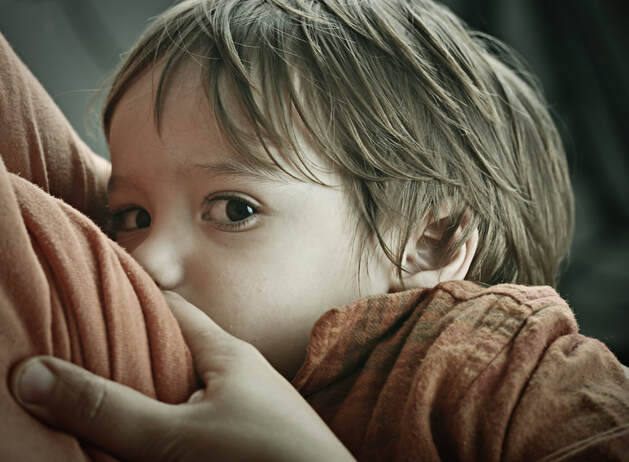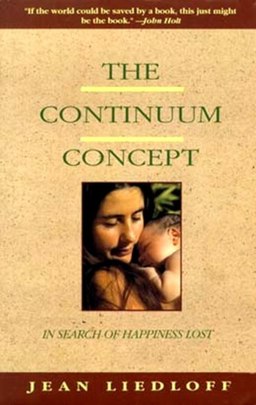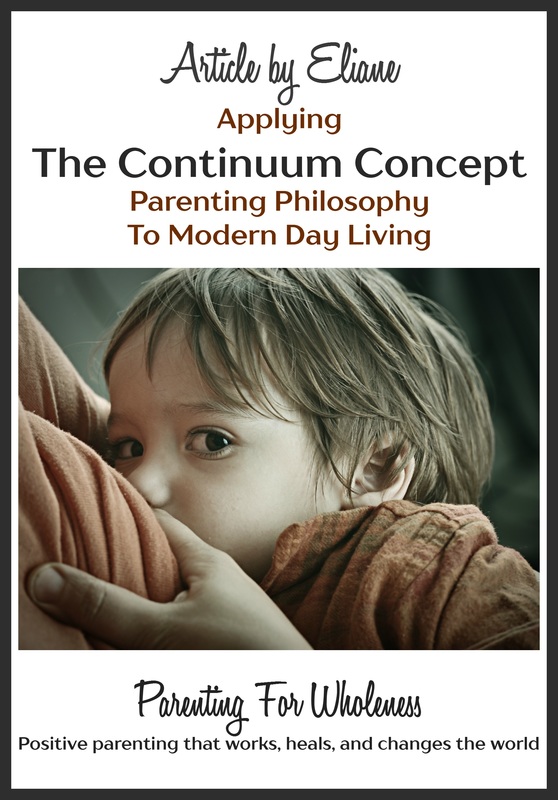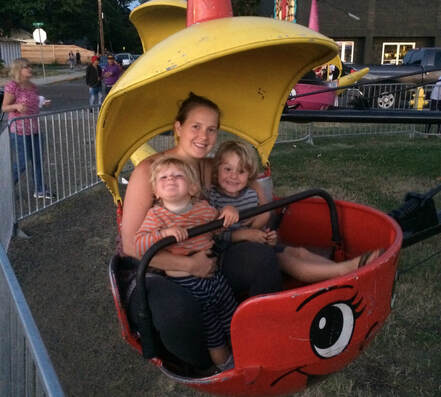I read The Continuum Concept when my oldest daughter Cassandra was two, after reading dozens if not hundreds of books before it.
I never read another parenting book after that.
This one was IT.
It so resonated with every part on my being that I knew I had to somehow find a way to apply it in my Western life. And made it my mission to do so. It was NOT easy! It took a few years, a wholehearted and unwavering commitment to it, and many tears on my part and on the part of my poor first child and guinea pig Cassandra. But what I can gratefully say is that once it really clicked, once I connected to the place in me which was awakened when reading the book and instinctually knew how to take care of my little ones, parenting became SO easy! I feel I owe Jean Liedloff (the author of the book) the incredible joy and ease I experienced in raising my 3 now grown daughters, as well the (mostly) intact spirits they get to walk through life with, which is so completely different from what my experience of life is. Here are a few examples of what I experienced in my family, which I completely credit to my embodying the teachings from the book:
What I most wanted for my daughters was for them to have an unshakable sense of self, be self-confident, inwardly motivated, self-sufficient and have the ability to find their own happiness in the world. I can say with a resounding ‘YES’ that I’ve achieved it, in spades, with all 3 of them. The word that comes to me, watching the way they move about in the world, is ‘unencumbered.’ Something I myself so long for and have worked pretty much full time on, for 17 years, to achieve in my own life. So what are the core things I took from the book and applied to my family, to my parenting? core principles
|
|
If you’re reading this article, my guess is that you already KNOW that your children are intrinsically good, that they don’t need to be ‘made’ good, that they’re not inherently flawed, bad or needing to be fixed. But what most parents don’t know is that children are also innately social. They really want to do the right thing. They want harmony, want to cooperate, want to make us happy. This is something that’s rarely understood by parents and that VERY FEW of us actually know how to apply to our benefit. Humans are social mammals. It’s built into our DNA to want to belong, want to fit into a tribe, learn from our elders. It’s built into us for survival of the species! We don’t want to be rebellious. It’s our conditioning that turned us to that. When we're deeply connected to the knowing that children are innately good and cooperative, it infuses every word we use, it guides how we approach any situation. It gives us access to responses and strategies that we wouldn’t have thought of otherwise. It allows us to tap into our children’s innately loving and cooperative nature. If you’re coming from this place and your child acts out, you’ll ask |
|
2. Being On The Same Team
Arguably the most important thing you can focus on in your parenting is being on the same team as your children.
When you’re treating them as though they’re on your team, you’re nurturing their sense of inner rightness. You talk with them and not at them. You engage their cooperation.
When your children FEEL that you’re on their team, they want to please you. They’re open to your input. They trust what you tell them.
So many of our relationships and interactions have an adversarial undertone to them that we don’t even notice it. There’s often a sense that one person is trying to get something from the other, is trying to convince the other of something, is trying to get their needs and preferences met over the other.
Working on creating an attitude of being on the same team means that we’re never trying to meet one person’s needs or preferences at the exclusion of another’s. We deeply value the other person’s experience as well as our own and look for win-win situations.
Here’s what it looks like in a family that operates on the ‘everyone is on the same team’ principle:
- Everyone’s needs and preferences matter equally
- Everyone FEELS that their needs matter
- Parents and children look for win-win situations
- There are no double standards
- There are no punishments, rewards or any other attempt to manipulate
- Disagreements are handled with discussions, respect and a focus on connection, meeting needs (as opposed to desires) and tapping into each other’s desire to cooperate
- Parents listen to children’s feedback and take action on it
3. Being A Clear And Benevolent Leader
What I’ve come to call clear benevolent leadership is one of the concepts most unique to The Continuum Concept, and is the hardest to embody, because most of us have had no examples of it in our lives.
Being a leader as a parent is tapping into the natural order of things, from an evolutionary perspective, in which children look to their elders to learn about the world and for guidance on how to conduct themselves.
The thing is that young children don't have the experience nor the big picture in mind to make decisions, in many situations. Therefore it is normal and healthy for us to make those decisions for them, for our family. This organically and quickly shifts as they get older and grow in their ability to make decisions.
At the same time it’s critically important that we guide them in a way that is totally respectful, nurtures their sense of self, and doesn’t in any way damage our relationship with them.
Here’s what it looks like:
- It’s really a way of being, a stance where we are clear, loving and grounded in ourselves.
- We deeply understand that our children are eager to contribute and cooperative.
- We know that they're are innately caring, compassionate, responsible, loving, etc., so that we don’t have to coerce them into any way to get them to act the way we’re directing them.
- We know that they want and need to learn from us how to function in our society.
- We completely respect and trust them.
- We always take their needs into account.
- And from this place we offer information matter-of-factly, knowing that they’ll welcome it and act on it.
- We don’t pussy foot around setting limits or telling them not to do something because we don’t fear that it’s going to negatively impact them.
- Nowhere in our words or attitude is there a hint that they’re bad or wrong.
- It’s so understood in the relationship that it's our place to teach our child that they automatically look for our feedback when not sure how to do something.
- If they are doing something that’s not appropriate, one look will be enough to understand and shift their behavior because of the level of trust that’s present.
- Often, all that’s needed is a look, (This is isn’t in any way done in a judgmental or shaming perspective, but from a very deep mutual understanding that it’s the parent’s job to show the child the way.)
It does take work to integrate, but I promise that once your leadership is established, your life will be so much easier! It might be even straight up easy, as mine was, so it’s well worth the time and focus to achieve it. And it is well worth doing any inner work you need to do around this to clear what’s in your way of embodying it.
If children don’t feel your clear leadership, they will act out as a way to express their inner discomfort. Their acting out is NOT a call for more freedom but a call for clearer guidance, for the leadership that will make their world feel right and will make them feel secure.
This is a huge topic and one I can’t do full justice to here. For more information on it, read my full length article on it (which includes a video of one of my beloved daughters giving an example of it,) “The Key to Well-Behaved Children Who Listen to You, While Fully Respecting Them."
4. Not Being Child-Centered
Another point that is unique to the Continuum Concept is that of not being child-centered.
As parents, we need to create lives that feel good to us, in which we focus on our own tasks and interests, while our children are on the periphery. What we do should be compatible with our children, but our lives are not about them and their activities.
Having our children be our entertainment causes a shift from their intrinsic motivation and their own connection to their activities, to an extrinsic motivation where they aim to please us and get validation from us. It cuts off their self-connection.
It also gets in their way of having their own space to be, do, learn and explore without any interference.
It leads to children who want a lot of attention, feedback and approval on whatever they do, who can’t just appreciate what they enjoy doing for its own sake but are dependent on the validation of another to enjoy it.
This is often the cause of children who feel very “demanding.”
I’m not saying that you should never play with children or engage in children’s activities. However, contrary to popular opinion, it is definitely NOT necessary to play with your children to meet their needs and build a strong connection with them.
But because of the artificial set-up of most of our families, our children are more reliant on us for their social needs than if we lived in ideal tribal situations. It’s perfectly appropriate for us to do things with them, as long as we genuinely enjoy them, but those things need to comprise just one part of our overall enjoyable lives that include a lot of our own interests.
I played countless games of Skip-bo, Rummikub, cards, as well as read books and did puzzles with my girls. As long as I enjoyed it and didn't make it my job. What I saw as my job was to ensure that their social needs were met.
Continuum Concept parents often feel caught between a rock and hard place trying to meet their children's needs and not be child-centered.
What I propose is what I call FAMILY-CENTEREDNESS. Most of us do not live in tribes (unless you’ve managed to find and make work the utopic intentional community most of us dream of) and need to make the best of our family and community configurations.
The goal of family-centeredness is to find a way of living and activities that meet everyone’s needs as much as possible.
Do make sure that you have activities that fulfill you and make you feel like you contribute! They can either be activities you can do while your children are engaged in something else in the same place, or which you do while they have activities away from you where their needs are being met. Or things you can do all together.
5. Trusting Children
Trusting children’s instincts tends to be one of the main things people remember when they think Continuum Concept.
Who can forget the example of the toddler handling a machete, or the baby crawling by the open pit?
I have to say that I’ve had some very clear examples in my family which proved to me that my babies and children had much better survival instincts than I ever would have thought. And I can share those with you if we ever talk. (Click here for an audio of me talking about this topic.)
But what I actually want to talk more about here is trusting them to make their own decisions.
A mom told me last year that she wasn’t willing to experience the consequences of letting her daughter make her own decisions. To which I responded with a whole impassioned article on how I was not willing to experience the consequences of NOT trusting my daughters. Of making their decisions for them. Of having them rely on me to guide their decisions and monitor what they do.
Giving them freedom to make their own decisions is what's allowed them to remain connected to their inner guidance, instead of them shifting their focus outward, to what others tell them.
The only person who will always be with them, whom they can always count on is themselves.
Therefore, I've seen it as my job as a parent to nurture and strengthen THAT relationship above any other.
Trusting my daughters to make their own decisions while they still lived with me allowed them to develop their experience while I still had influence on them, and could still give them my opinion and feedback.
By the time they move away from me at 18 (Cassandra has been in Florida for 4 years and Audrey in New York City - of all places! - for almost a year,) they have been making all their decisions by themselves for a long time, therefore are very well equipped to make them.
Trusting my daughters to make their own decisions, from toddlerhood on, has made my life as a parent so much easier than those of most other parents I've seen.
And it's ensured that my daughters knew how to keep themselves safe, rarely got hurt and are now well equipped to handle life on their own.
6. Children Do What We Expect Them To
Our children respond to the beliefs and attitudes that are underneath our words, actions, and reactions. It’s by changing those beliefs and attitudes (often times through doing deep inner work) that we can shift to having happy and cooperative children.
A common area where this is obvious to Continuum parents is physical safety. Many families report experiences such as mine, when the only time one of my girls cut herself with a sharp knife is when my very non-Continuum father yelled out ‘Be careful!’ and she turned abruptly in response to his extreme reaction, and nicked her cheek.
Think of how differently you’ll respond if a child is climbing high on a structure and you trust that he knows what he’s doing, versus if you think he’s incompetent in taking care of his own safety. And then think of how you’d feel on the receiving end of each of those responses, and how it might impact the way you react in each situation. This may give you a sense of what I’m talking about here.
But an area where this concept is much more pervasive, hidden to many, and damaging, has to do with our beliefs about children, and humans in general.
For example, even if you intellectually believe that your child is innately good, your programming, because it’s what you experienced from infancy on with your parents, might be that children are not. You might have been treated as though you were defiant and bad, and in need of correction and molding, through punishments and rewards.
|
Therefore when your child ‘acts out,’ your response to him stems from this deeper place of not believing that he truly wants to do the right thing. He then reacts to the way you responded to him, and this starts an adversarial downward spiral.
To put this life-changing concept in practice, when your child is not listening to you or acting in a way you don’t like, turn your focus to yourself and check what’s happening inside of you. What he might be responding to. What he’s mirroring to you. What I’ve found in my work with parents, is that once the clean parenting foundation has been established and parents make sure their children’s needs are met, the resolution of almost all issues comes from the parents clearing in them what is triggered or mirrored in those situations. |
3 CAVEATS FOR MODERN FAMILIES
But as much as The Continuum Concept can open our minds to a total new possibility of being with children and life with them, and provide us with the basis to raise truly whole children and have ease in our families, there are times when the blessing of this beloved book turns into a curse.
There are three very common things I want to warn you about, which fans of the book often struggle with, and causes them much unnecessary turmoil:
1. Be realistic!!
You may dream of providing the perfect tribal and natural environment to your children that Yequana parents do.
But the reality of your life is that you can’t. And you HAVE to accept that, if you’re to enjoy being a parent, and in order to be the best parent you can be to your children.
Take time to acknowledge and mourn what you dream of, and isn’t, and then move on!
Keeping your mind on what you think should be and isn’t, unless you’re taking concrete action steps to achieve it, will only cause you, and therefore your children, pain.
It’s really just about accepting reality!
You wanting reality (or yourself!) to be different will NOT change it and will prevent you from finding the best ways of actually working WITH what you have.
2. Trust Yourself Instead Of The Book
This topic is one of my pet peeves with Continuum Concept parents. If you know me, you’ve likely heard me say that some parents should throw out or burn this book, even though it's my parenting bible.
Why?
Though I’m a firm believer in studying to learn better ways and in getting guidance from people more experienced than us, with whom we resonate, this can backfire when we try to copy or emulate something, instead of listening foremost to our instincts, to our inner voice.
So use the book as a reference and guidance to connect with what’s true for you and what works for your family.
But DO NOT have your eye on an imagined and likely impossible vision of what you think would be ideal, at the exclusion of what feels right to you or works for your family, in your specific situation.
This gets you in your head instead of being in your heart, your body, your intuition, connected to life, instead of just being present.
Above any theory, ALWAYS honor your instincts and your feeling of what’s right in the present.
I’ve seen many parents be miserable because their life doesn’t represent their Continuum Concept tribal ideal, whereas they could be very happy if they could only forget they ever read the book.
I've seen one mom's life completely changed just because I told her that she was right on track, to keep doing what she was doing and to totally forget about the book.
She reported back to me a few weeks after we talked, saying that she was suddenly more confident and was actually enjoying her son much more.
JUST BECAUSE SHE STARTED TRUSTING HERSELF AND STOPPED QUESTIONING HERSELF!
Just like you can trust the sense of rightness in your children, the one thing you can always trust is the feeling of rightness in you (below the thoughts and the crap—what’s there when you just ARE). Trust that, above any book or any expert’s advice, including, of course, mine!
3. You Will Not Automatically Have A Yequana Toddler Because You Complete The In-arms Phase!
And you’re not doing anything wrong if you don’t!
Some of the reasons your toddler (or older child) isn’t like Yequana toddlers are:
- You don’t know in your bones how to be a clear leader for your child. In fact, chances are you’ve never even experienced one! This is something you need to develop.
|
CONCLUSION
Though living like the Yequanas is not possible for us, as much as we may long for it, there’s A LOT we can learn from them and integrate into our modern lives.
Is it easy? Absolutely not.
Is it doable? YES!!!
I did it, even though I was a pretty clueless and very messed up 26 year old when I first read the book, and still mostly managed to implement it.
What I did know was that I didn’t want my daughters to grow up with the same pain and feelings of worthlessness and not belonging as I did, and which I still to this day sometimes struggle with.
I’m not sure what in me had the drive and clarity to go for this with such determination and unwavering focus, but I am SO grateful to the young mom I was for doing so!
Because we’ve all reaped its benefits in ways I could only imagine, and had never been a witness to in other families.
And I now have the joy and incredible honor of supporting countless parents in also experiencing the same results in their families.
Then join me in my next Clean Parenting group!
|
If you want my full and dedicated support in integrating all I described in this article in your family, my Clean Parenting™ Program goes in depth into every one of these elements and many many more.
Email me to set up a FREE 30 minute Parenting Can Be Easy! Strategy session and we can discuss if it would be the right fit for you and your family. Click the images to find out the start date of my next group, for program details, and to read many testimonials of parents who have completed this program. |
Here's what Kristen Phillips of Cottage Grove Oregon wrote of her experience of working with me for support in applying the Continuum Concept approach in her family:
"I’m not sure I can quite put into words exactly what Eliane and her programs have done for me. When my first son was born, my world completely changed. So many things that I thought I knew suddenly didn’t make sense, and philosophies I believed in no longer resonated. His arrival shook everything up.
As I ferociously searched the internet to try to find some “parenting style” that did feel good to me, I came across The Continuum Concept. When I found it and started reading it, I could feel that this was THE book I was looking for. My whole body relaxed once it was in my hands and I started digesting it. As much as I loved that book, I could tell pretty quickly that I was going to need help applying it in this modern world. As I got back on the internet to find that someone, I of course came across Eliane’s work. And while reading the first article of hers I found, I again got that familiar feeling of this is THE person. Every single word she wrote seemed to hit straight to my heart, and I was like “yes! this is 100% it!”
Once my son got old enough, I did the Clean Parenting Course. Doing that course was on par for changing my life as having my first child. It's like someone finally helped me unlock my soul and helped me really see what the possibilities of life, love and relationships were. I felt I had the keys to becoming the mother and person I was destined to become, I learned so much about myself during that course.
Since then, I have worked intimately with Eliane and done the Deep Healing Program and Clean Relationships Program along with many, many healing sessions. Eliane has become somewhat of a “fairy godmother” in my life- someone who really gets me, is on my team, and is continually helping to guide me back to my greatest source of strength- myself. Between Eliane and the Sisterhood group, I feel like I have someone whom I wholeheartedly trust holding my hand along my journeys of parenting and life.
My life, my children’s lives and my husband’s life have all been impacted in the best way possible. I will forever be grateful for Eliane and her continual support. She has really become like part of my family and I cannot imagine my life without her and her work."
|
GET MY BOOK!!!
(All based on the Continuum Concept philosophy) Over 100 pages of inspirational and practical information to help you successfully and consistently parent peacefully, so you can have whole and happy children, and experience ease and harmony in your family. Get this e-book for $9.97 Click 'Return To Merchant' once you've completed your payment, for immediate access to the e-book, or wait for an email with a link to it (may take up to 24 hours.) If you have a problem with the payment, you can pay $9.97 through the DONATE button on this page, and I'll get you set up. |
- Continuum Concept Resources, by Parenting For Wholeness
- What Loving and Effective Parenting Looks Like - an Example from the Huxtable's, by Eliane
- The #1 Question to Ask When Your Child 'Misbehaves', by Eliane
- How Do I Stop Myself Midway When I'm Triggered? by Eliane
- Creating Support For Our Continuum Concept Parenting Journey, by Eliane
- Who's in Control? The Unhappy Consequences of Being Child-Centered, by Jean Liedloff
- Restoring Harmony: A Mother's Story, by Abigail Warren
- The Continuum Concept - It Works!!! by Eliane
- The Quick Start Program, Parenting For Wholeness
- The Clean Parenting™ Program, by Parenting For Wholeness
REFERENCES:
- The Continuum Concept, by Jean Liedloff
- The Clean Parenting™ Program, by Parenting For Wholeness
- The Key to Well-Behaved Children Who Listen to You, While Fully Respecting Them, by Eliane
- Parenting Can Be Easy?!? by Eliane
- Does Your Child FEEL That You're On His Team? by Eliane
- Why It's Critical That You Trust Your Children, by Eliane
- Is This Really Possible?!? One Family's Experience of Natural Parenting, by Eliane
- The Almost Magical Formula For Surprising Ease and Harmony in Your Family While Fully Honoring Your Children’s Spirits, by Eliane Sainte-Marie
I loved this article cause I also read the book when my kids were 7, 5, 3 and 1. It was a big eye opening experience on so many levels. We then started home schooling and have never looked back. I would like to hear your view on teens and their smartphones and digital gadgets in general. Thank you
Hi Nicky, I'm glad you enjoyed the article and love to hear that you're also a fan of The Continuum Concept. Are you part of the Continuum Concept Connection Facebook group? It's my favorite public FB group!
I was recently asked about the use of screens on a Q & A call I hosted, and posted the recording of that discussion on Sound Cloud. Here's the link to it: https://soundcloud.com/parenting-for-wholeness/is-it-okay-to-let-my-son-use-screens-when-were-out. It encompasses a lot of my thoughts about it, though there's a lot more I want to say.
So I'm also working on an article (or maybe a talk) on the topics of food and electronics. If you're on my email list, you'll get notified of it as soon as it becomes available.
Thanks for writing to me!
I came across this article last night. I've never read the book. But I've always been this kind of parent! I thought I was just weird! I've ordered the book and can't wait to read it! I've been so alone in my parenting style. We live in Texas and people can be really closed minded! I needed to know I'm not alone, if that makes sense? THANK YOU
I'm so impressed that you were able to parent in this way without even reading the book! You're definitely not weird: you're awesome!
Where in Texas are you? I've worked with 3 moms from that state who also felt isolated. I'd be happy to connect you!
In fact, I'm working on a way to connect all my fans and subscribers, many of whom feel isolated and know few if any people who parent as they do. This will become available in early 2016. Make sure that you're on my email list if you'd like to be notified of it!
Best,
Eliane
I'm also from Texas raising twin granddaughter s trying very hard to fight the instincts I was taught in my childhood and gave into with myviwn children witch probably has a lot to do with my daughter not being empowered or ready to raise her three children. Please conect with me need help love all these concepts saw a differense in one day just changing my language in the smallest ways.
Hi Erin, How wonderful that you're caring for your grandchildren! They are very lucky to have you. And I'm glad you've so quickly seen changes when applying the principles I shared here.
I'm not sure what you're looking for in terms of connection. Do you want me to add you to my email list? Or meet with me to see which of my programs would be best for you?
Thank you Clare!
I see you finally managed to articles. :-)
Lovely article! I have a question though, my son is 4.5 months and despite spending a lot of time next to me in the carrier from birth, he now doesn't really like to be in it. Now he is at a stage where he is learning to move his body but is frustrated & clingy. So when we try to involve him in our lives e.g going to see friends, he gets very upset very quickly. Likewise at home, if I let him roll around on the floor at home or engage with him, he soon gets overstimulated. So my question is how you apply this feeling of belonging when they just can't seem to adapt to social situations but are younger than the toddler age you discuss? Thanks for your reply
Hmm, I feel like I'd need to talk with you more to get a better sense of what might be going on. One thing I can think of is that maybe you need to be using a different carrier, that is not as restrictive. I used a ring sling, and I remember for a while, as my babies were becoming more mobile, that there are times I'd just put the sling between their legs to support their weight, while I still had to hold them for balance. So they didn't feel frustrated. I'd also around that age at times placed them facing forward, with legs folded as a pretzel, so they could see well.
But I have a sense that there's something else going on with him getting upset when you visit friends or play with him.
Often times, our children respond to our own feelings. So are you feeling happy, content, relaxed and trusting? If not, your son could be acting out your own feelings.
Are you in the Continuum Concept Connection Facebook group? If not, I suggest you join, and if you are, I'd suggest you post this question and tag Alexsandra Burt in it. I find her much better at answering babies related questions than me.
Also, I've been thinking about hosting a TCC Q & A call soon, so if you're not on my email list, make sure to get on it if you want to be notified of it.
What if your child is 12, is it too late to parent this way? Where do I start if it's not?
My older son is about to turn 13. Due to life-threatening circumstances surrounding my younger son (now 10) for the past 2.5 years, he was put on the back burner. Now, I want to make up for lost time, but I've found that I hardly know who my 13-year old is, and I've lost whatever connection we once had. It is heartbreaking. Your parenting style resonates with me, but how do I apply it to a child so far gone because of... well, my emotional neglect?
Hi
Your story about yourself is exactly how i feel right now, so much so it brought me to tears. I want my daughter to grow up strong and not doubting herself, I want to do this so bad and your tips are really helpful!
So glad you found the article helpful, Becky! And that you also have that fire in your belly to insure that your daughter grows up whole. She's a lucky little girl! ♥
Why did you not respond to the comments posted about older children?
I am soooo glad I found this article. Thank you! I don’t have kids yet, but I just read this book and I was feeling so overwhelmed and discouraged trying to figure out how to find or create the utopian community where this would be possible! Thank you for bringing this concept into the modern day and making it feel 100% possible! In the book, Jean mentions that mothers should be with other mothers or women (for example doing housework at each other’s house), but I’m not sure how feasible this idea seems to me. I would love to know if you have suggestions for how to ensure that both baby and I are in situations that are more communal that typical these days when mom stays home with baby. Thanks in advance for your help!
I think you have to start with friends/ family-- even just a once a week thing where you cook a meal together then over time it may be things like, helping with yardwork or sewing, going for walks... the relationship has to build since most of us are so isolated and have a determination for "I can do it without anyone's help".
I have loved the book and your article. I do have one thing that bothers me and don't know what to do... in my community you hear too often of kidnappings or molestation of children-- I myself was molested by an older child when I was younger. I have a 20 month old, so she's obviously too young for me to leave her on her own anyways, but I am concerned as she grows up that this threat is real and exists in our world. I know the fear itself creates an attraction to the outcome, but I cannot figure out how to let my child explore at further distances from my sight, or without my supervision. I know an option is to move away to a safe place (not sure when that will be possible), but that fear has been provoked in me by my community. Any advice? I know its a difficult one to figure out, just curious what you would think.
Love this article, and enjoy reading it once in a while! Thank you for this!










